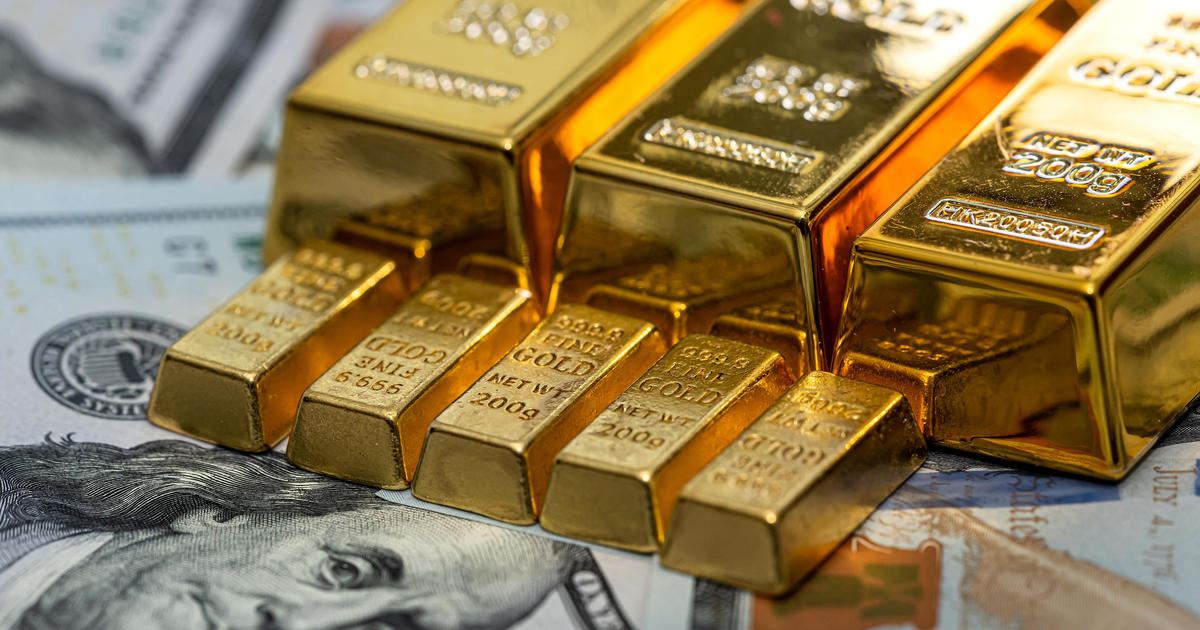Stocks continue to wobble a day after S&P falls into bear market
Stocks are sliding on Wall Street Tuesday a day after dropping into a bear market.
The S&P 500 was down 14 points, or 0.4%, as of 11:30 Eastern Time on Tuesday, while the Dow dropped 0.5%. The tech-heavy Nasdaq edged up 0.1%.
In the early going, Treasury yields slowed their monster moves higher. There was also some positive news from U.S. companies. FedEx jumped 9% after sharply raising its dividend and business software maker Oracle soared 10% after easily beating earnings estimates.
Tuesday's slump follows downbeat headlines from Monday on Wall Street, where the benchmark S&P 500 lost 3.9%, taking it 21.8% below its peak. That means a bear market, when an index has fallen 20% or more from a recent high for a sustained period of time.
Yesterday's turmoil set off a wave of panic among Americans worried about their 401(k) retirement savings, with experts quick to caution against fear-based decisions. Global stocks drifted lower Tuesday in the wake of Wall Street's tumble into a bear market, as investors anxiously contemplated a new and uncertain world of higher interest rates, international conflict and recession fears.
At the center of the selloff is the U.S. Federal Reserve's effort to control inflation by raising interest rates. The Fed is scrambling to get prices under control and its main method is to raise rates — but that is a blunt tool that could slow the economy too much and cause a recession. The war in Ukraine is sending oil and food prices sharply higher, fueling inflation and sapping consumer spending, especially in Europe.
"The old, pre-corona equilibrium, with low inflation, ultraloose monetary policy and low geopolitical risk premiums no longer holds," said Andreas Koester, head of portfolio management at Union Investment in Frankfurt, Germany.
"Now we are in a transition to a new, post-corona equilibrium, of which only the outlines are visible, such as higher inflation levels or a return to great power competition on the international scene," Koester added.
Higher rate hikes?
Some economists are speculating that the Fed may raise its key rate by three-quarters of a percentage point when it meets on Wednesday. That's triple the usual amount and something the Fed hasn't done since 1994.
Apart from jitters over inflation and what central banks are doing to temper surging prices, restrictions to curb the spread of COVID-19 in China also have been weighing on market sentiment in Asia.
The shift by central banks, especially the Fed, toward higher interest rates has reversed the spectacular rise in share prices spurred by massive support for markets after the pandemic hit in early 2020. Markets are bracing for more bigger-than-usual hikes, on top of some discouraging signals about the economy and corporate profits, including a record-low preliminary reading on consumer sentiment soured by high gasoline prices.
Higher interest rate benchmarks raise returns on less speculative investments such as bonds, increasing their attractiveness relative to stocks. And the moves, by design, will slow the economy by making it more expensive to borrow.
The risk is central banks could cause a recession if they raise rates too high or too quickly. Last month, the Fed signaled additional rate increases of double the usual amount are likely in coming months. Consumer prices in the U.S. are at the highest level in four decades, and rose 8.6% in May compared with a year ago.
Allianz Chief Economic Adviser Mohamed El-Erian echoed concerns about inflation picking up steam. "I think you've got to be very modest about what we know about this inflation process. And I fear that it's still going to get worse, we may well get to 9% at this rate," he said this weekend on CBS News' Face the Nation.
One of the more reliable warning signals for an economic recession has been sounding as short-term U.S. Treasurys briefly yielded higher than longer-term ones. That can be a sign of pessimism about long-term prospects and signal a recession might be on the way.
Another factor influencing inflation and investor sentiment is the price of oil. It remained over $120 a barrel Tuesday, about 60% up so far this year.
Benchmark U.S. crude bounced back from losses earlier Tuesday, gaining 54 cents to $121.47 a barrel in electronic trading on the New York Mercantile Exchange. It gained 26 cents to $120.93 on Monday.
Brent crude, the international standard, gained 62 cents to $122.89 a barrel.
Cryptocurrency crisis
Bitcoin also took a hit Monday, falling to roughly $23,400 Monday afternoon, down more than 16% in the past day. Ethereum, another widely-followed cryptocurrency, was down more than 20%. The total market value of cryptocurrencies plunged below $1 trillion on Monday to $983 billion, the first time it has dropped below that mark since January 2021, according to CoinMarketCap.
Meanwhile, Coinbase announced plans to lay off 18% of its employees, CEO Brian Armstrong said Tuesday, marking yet another cryptocurrency exchange that has slashed jobs in recent weeks.



